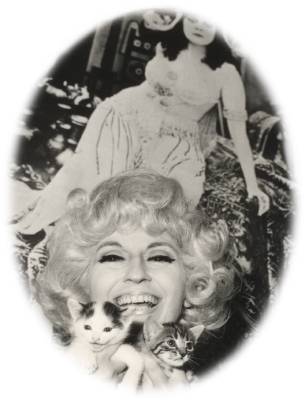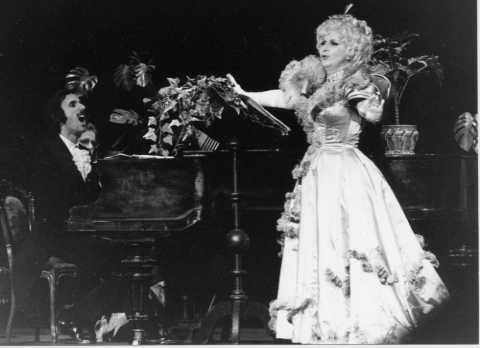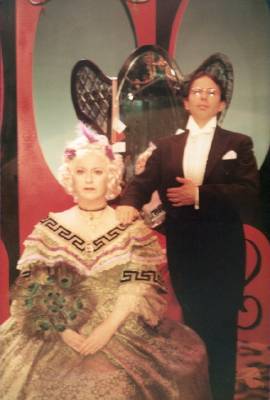|
<< -- 6 -- Jennifer I Paull HIGH JINX AND HAUTE COUTURE

Laughter is the closest distance between two people. -- Victor Borge (1909-2000), also known as the 'Clown Prince of Denmark' and the 'Great Dane', pianist, entertainer, humorist
The wonderful Victor Borge (Why are the piano keys so yellow? The elephant smoked too much) and unforgettable Gerard Hoffnung ([1925-1959], instigator of compositions such as Malcolm Arnold's A Grand Grand Overture for three vacuum cleaners, floor polisher, four rifles and orchestra), were both musical clown-cartoonists. Joyce Grenfell (George Don't do That, Joyful Noise, I'm Going to See You Today) and Anna Russell (I'd Be a Red-Hot Mama If I Hadn't Got These Varicose Veins, Anaemia's Death Scene, I Gave My Love a Cherry without Any Pit) wrote many hilarious original texts and songs meant to entertain, which they certainly did! Jokes about life and about music abounded with them all, and oh, so cleverly!
Cathy did not imitate their work. She did not write works (or texts) with the sole purpose of being deliberately entertaining. In her Stripsody, which is very funny, she is also intellectually groundbreaking. This piece is her tremendous idea of encapsulating the onomatopoeic sounds from printed (therefore silent) strip cartoons. That was, as she put it, 'a divertissement rather than a composition' [Music is the Air I Breathe] -- but one could argue the point. She was (uncharacteristically) modest about her compositions. Niklaus Harnoncourt referred to her as a composer with much respect [Music is the Air I Breathe]. Even as such, her originality, as always, was based upon word play. Une saltimbanque vocale sounds more elegant than 'a vocal acrobat'; the required technical ability for this work's successful performance.

Photo given to Jennifer Paull by Cathy Berberian
|
Parodies like Dudley Moore's Little Miss Muffett and Die Flabbergast; the works of 'P D Q Bach' (Peter Schickele), 'The Civilian Barber' or 'Hansel and Gretel and Ted and Alice (an Opera in One Unnatural Act)' are great musical fun, not musically intellectual originals. Many such continue to be written today and she would have laughed and appreciated their cleverness. Cathy's humour was neither slapstick nor 'obvious'. It was layered with inner meanings and was always based upon showing some words for what they really are -- often utterly ridiculous. She underlined what already existed in the text and in the music: a connoisseur's musical high-jinx indeed! With titles such as Father's a Drunkard and Mother is Dead, words by Nellie H Bradley and music by Mrs E A Parkhurst (1866), this temperance song about the innocent victims of alcoholism (Proust recital) was an historical caricature in itself.
We were so happy 'till father drank rum,
Then all our sorrow and trouble begun.
The correct participle sadly not rhyming with 'rum', the dear temperance ladies felt obliged to commit verbslaughter (with aforethought) to make their point! A discreet wince at the horror of the word made it even funnier. Another line includes the phrase 'all the day long'. In her parody of the genteel upper classes, Cathy pronounced this as 'lawng' -- about as closed a vowel as trans-Atlantic accents render it open. In so doing, she added another layer of meaning to her interpretation. She disassociated herself socially from the perpetrators of the grammatical transgression by not acting the part of the original singer of the song. Rather, in the third person, she was imitating a 'lady of good charitable works' and lampooning her hauteur, not the message that the needy should be helped. To create her humour, Cathy didn't need Electrolux or lawnmowers; she needed history, eclectic knowledge, existing texts, and a very fertile imagination.

Bruno Canino and Cathy Berberian singing a duet section from 'Father's a Drunkard and Mother is Dead'. Photo © Wolfgang Eckhardt
|
Of course, her Beatles 'arias' were intellectual jigsaw puzzles. How else can one describe a song sung in the style of another singer (Joan Baez) had she taken lessons with yet another (Elizabeth Schwartzkopf), to qualify but one (Ticket to Ride; recital From Monteverdi to The Beatles)? You were expected to be in the know, and if possible, in several languages. Her international audiences were; as well as being very numerous, totally enslaved, and very faithful.
One of her favourite arias from Jacques Offenbach's (1819-1880) La Périchole (Proust recital) starts:
Tu n'es pas beau, tu n'es pas riche,
Tu manques tout à fait d'esprit;
[Henri Meilhac and Ludovic Halévy / Jacques Offenbach, 'La Périchole']
'You're not rich, you're not good-looking, and you're mighty dumb with it' -- my liberal translation. 'How could anybody sing that seriously?' she used to ask me. But many who thought only of the voice and not of the words did (as with Tom der Reimer), and still do.

On set with Harold Lester, about to perform 'Tu n'est pas beau' from Offenbach's 'La Périchole'. Photo courtesy of Harold Lester
|
Once you label me you negate me. -- Soren Kierkegaard, Danish existentialist philosopher (1813-1855).
There is nothing about the thread of inspiration spun from Russell to Grenfell, Berberian to Migenes that one can easily label or classify within the confines of a convenient pigeonhole. Perhaps their style of intellectual ping-pong with the audience could only originate within a feminine mind? There is individuality yet a linked, indefinable suppleness as each did/does her own thing so wonderfully well.
Continue >>
Copyright © 4 July 2006
Jennifer I Paull, Vouvry, Switzerland

|

